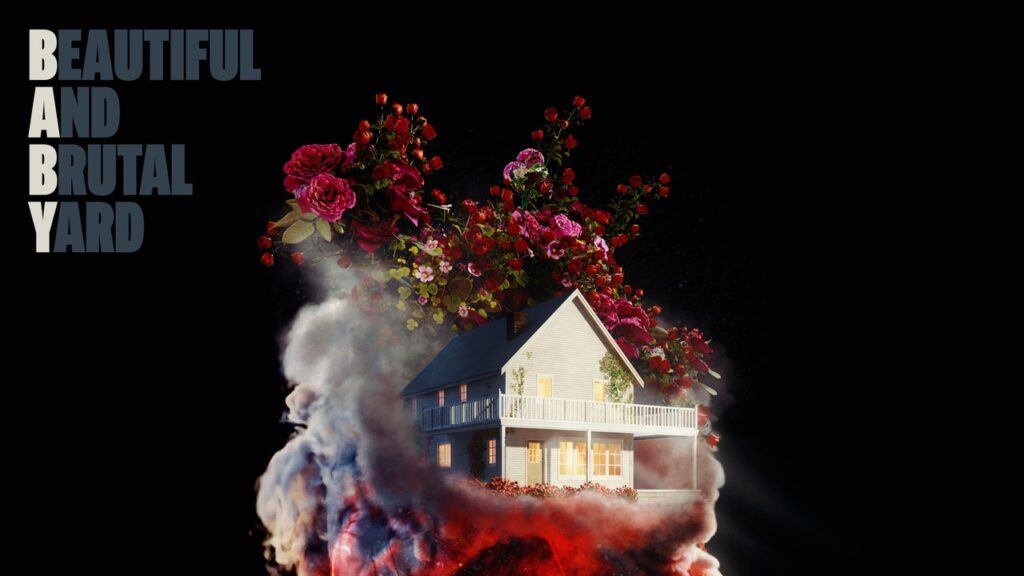
Russian dissident Aleksandr Solzhenitsyn’s best-known revelation after a decade of exile and imprisonment was that “the line between good and evil runs not through states, nor between classes, nor between political parties either—but right through every human heart.” J Hus seems to have had a similar epiphany after 27 years of London, and eight or so navigating the music industry. On the cover of his third album, Beautiful and Brutal Yard, there are two houses: one engulfed in flames, the other smothered in bright blooms. Smoke and petals intermingle, and the whole thing takes the shape of a human heart.
Like Solzhenitsyn, J Hus is just as concerned with unpicking the knots of his own humanity as he is the societal structures and injustices that have shaped it. Where a contemporary like Dave trained his focus on the meta structures, Stormzy on the spiritual, Hus is utterly physical: in his comic posturing, in the way he rolls words on his tongue like hot food, in his juvenile descriptions of sex, and—more so than perhaps any other rapper working in the UK at the moment—his ability to make even the stiffest listener move. More specifically, he’s interested in what it means to be a man. Driven by this inquiry, Beautiful and Brutal Yard ends up a sprawling tome on the nuances and pressures of Black masculinity. The album’s intro implores Hus to show people the real him; the rest of BABY is the sound of him figuring out what exactly that means.
After 2020’s Big Conspiracy was mired by leaks and a forced rush release, Hus effectively disappeared from public life. (The fact it still hit No. 1 in the UK spoke to his unique influence.) He wrote off live shows and sequestered himself in the studio, emerging sporadically as a featured artist. It was around this time, you sensed, that Hus started wondering where he truly belonged. “I was in my home but I was feeling like a foreigner,” he raps over a tumbling bassline on “Comeback.” In BABY’s album trailer we see him pulled between country estate and social housing. But more than what or where you call home, it’s love, pain, and power—and how men can express them—that form the binding concerns of BABY. So we hear Hus operating in different modes: walking guns into nightclubs, robbing watches over palm wine guitars; curling up with Jorja Smith on “Nice Body,” while she begs him to open up. Wanting to flirt, on “My Baby,” he downs drinks for Dutch courage.
Hus has always contained these multitudes. The one bounding out of prison and onto Drake’s stage at the O2 in 2019, and the one—hot-headed, with PTSD—that put him behind bars in the first place. The one obsessed with willies and the one with weapons; the one obsessed with calling his willy a weapon. He rhymes in patois, MLE, pidgin, and Wolof. Musically, BABY slides effortlessly between moods too: horns and slinky drums here, plucked G-Unit strings and sliding 808 basslines there. Long-time collaborator JAE5 is absent from the writing credits, eschewing his usual anchor role, but the album still boasts a remarkably consistent sound, thanks to keen interplay from the likes of TSB, iO, and Levi Lennox. Thumbed, hall party highlife basslines are refigured for a new generation—though some of the more choice lyrics about “the finger blaster” and sticking a “thumb in your anus” might raise more than blushes among the aunties and uncles. The instrumentation is plush and organic: Drums slap and rumble, skin on skin; guitars glisten. If 2019’s “Must Be”—all sex-groove sax and murderous threats—was Hus experimenting with a distinctly Black British take on G-funk, then those trials have reached maturation here.
All this opens up pockets for Hus to explore and subvert the clichés of modern masculinity. He’s endlessly playful with language, toying with his vowels on “Massacre.” He channels the ironic East End gangsterism of Guy Ritchie movies and grime MCs on “Come Look,” where intimate descriptions of violence play off against threats to whack someone’s “noggin.” The charisma with which he carries it off only emphasizes how awkward Drake is droning on about “your backside” being “so fit” on summer front-runner “Who Told You.” Other guests to the Hus house fare better. Naira Marley is pure arm’s-length cool on “Militerian”; Villz reprises his road-rap sidekick role from a 2015 Crib Session on “Comeback”; and Burna Boy delivers a hook for the ages on thematic centerpiece “Masculine”—splitting the word “balaclava” into an exquisite couplet. It’s the kind of touch that would seem simplistic if it didn’t come dripping with so much charm.
Back in 2017, Hus clammed up with shyness at a mention of the Wolof nickname, “baba,” that his mum gave him. “I think it means baby or something in my language,” he said. Six years later, as BABY draws on (it does lack some of the compactness of Big Conspiracy), Hus raps a whole song in his mother tongue. Even laying aside the technical feat, “Come Gully Bun (Gambian President)” feels revelatory as he figures out how to piece all the bits of himself together. “Avoid all the bullshit and the nonsense,” he soothes on the final track “Playing Chess”—a whole world away from the gun-waving opener. “I know how it feels but I can’t really say,” goes the chorus, at a loss for words. “I did let myself go,” he re-roots himself, “but never again.” Welcome home, Momodou.
